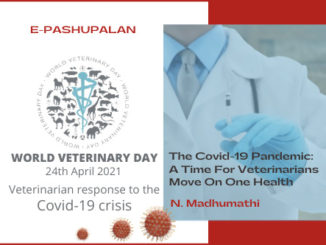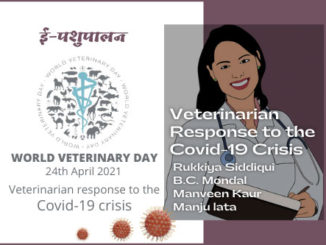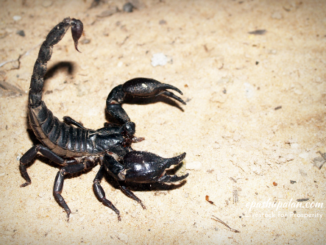In the face of the current pandemic, solidarity is key.
On December 31st, 2019, a pneumonia of unknown cause was reported to the World Health Organization Office in China. In a few months, the world was unified in the battle against an infectious pandemic caused by SARS corona virus 2 or the novel corona virus. The disease has now spread to every continent, sickened millions of people, claimed the lives of hundreds of thousands of people, destroyed large swaths of the economy, and, predictably, poisoned some livestock.
The ongoing COVID-19 pandemic has altered our lives and had a huge impact on human and animal population around the world. Veterinary medicine, on the other hand, has meaningfully and quickly advanced through this difficult era, demonstrating veterinarians’ willingness to cope, change, and adapt, as well as their ability to continue in their roles as leaders of animal health and welfare and public health.
Over the past year, the COVID-19 pandemic has placed significant strain on public health systems all over the world. Even if the virus that causes COVID-19 is thought to have originated in animals and that certain animals have been infected by humans, the pandemic is being driven by human-to-human contact. To date, there is no proof that animals are playing a major role in the disease’s propagation. This pandemic has a wide range of effects on people, reminding us that multi-sectoral cooperation, in line with the “One Health” strategy, and knowledge sharing are more critical than ever. A huge amount of information has been collected in a short period of time. However, several questions remain, and more work remains to be done to better understand the virus’s origins and how it reached the human population. Scientists are working round the clock to better understand the virus and its evolution, establish interventions, and improve capacity to respond to this human health crisis.
Veterinary professionals have always played an integral role in public health through research, parasite prevention or reporting cases of possible zoonosis, the veterinary profession has been an invaluable asset in the protection of animal and human health.
Aside from collaborative research, the animal health sector, especially Veterinary Services, helps to create an appropriate response to the pandemic in a variety of ways.
- Supporting the diagnostic capacity of human health services by activities such as surveillance screening, by testing human samples
- Donating essential materials such as personal protective equipment and ventilators.
- Volunteering in hospitals and laboratories when human resources were not sufficient
- Veterinary epidemiologists have been supporting their counterparts in the public health response to track the disease in humans and to support the development of effective public health interventions
- The activities of Veterinary Services contribute to addressing critical needs, which are heavily challenged in the current circumstances: food security and safety
- Safeguarding animal and public health, global security and international trade.
- Mission is to set animal health and welfare standards, to inform, and to build capacity to accompany Veterinary Services across the world to address the situation
- Developing expert opinion on the effects of COVID-19 for animal welfare and veterinary public health, sharing results of ongoing animal studies, and developing scientific advice on research priorities
- Working with Wildlife Working Group, Member Countries and international partners to develop an ambitious work programme with the aim of reducing and managing the risk of overflow of events between wildlife, livestock and humans
- Improving disease control in wildlife
- It is critical to assist countries in ensuring global accountability and reporting on animal and public health issues. Any SARS-CoV-2 infection in animals should be reported to the World Animal Health Information System (WAHIS), in accordance with the OIE Terrestrial Animal Health Code.
- Keeping a global perspective and foresight on animal welfare and its inextricable connection to public health.
- Early identification of potentially harmful animal and human health risks, as well as timely implementation of effective control measures by competent national authorities, are possible due to animal disease surveillance.
- A new initiative aims to enhance the treatment of animal diseases.
- It is now clear to all that animal and human welfare are inextricably linked and play a critical role in achieving a prosperous and safe world. Particularly if we can successfully integrate the environmental and socioeconomic aspects.
- Protecting the health of animals in order to preserve our future
- To address health risks, a collaborative approach is required.
- Antimicrobial resistance is a global health problem that affects humans, animals, and plants. Antimicrobial resistance is primarily caused by the misuse and overuse of antimicrobials in humans, livestock, and agriculture.
- People who aresuspected or confirmed to be infected with the COVID-19 virus should avoid close contact with animals, including farm, zoo, and other captive animals, as well as wildlife.
- Simple hygiene steps should always be followed when treating and caring for animals as a general rule. Handwashing before and after being near or handling livestock, their food, or equipment, as well as avoiding kissing, being licked by animals, and sharing food are all examples of this.
- Hundreds of millions of dollars are spent every year on disease control in order to increase livestock health and productivity around the world. However, there is no comprehensive way to assess the impact of animal disease on human health and well-being. As a result, decision-makers are unable to determine if their investments are focused on the animal welfare problems that have the greatest effect on human health.
The mysteries around this virus require new and innovative approaches to tackle it; these will only be developed through cross-sectoral collaboration and collective action. It is important that Veterinarians continue to carry out various responsibilities. The economic, animal health and food security consequences of COVID-19 are as critical as ever.
There is no indication that pet animals are playing a part in the spread of SARS-CoV-2 infections in humans. However, since this virus can affect both animals and humans, it is recommended that people who are suspected or confirmed to be infected with COVID-19 virus avoid direct contact with their pet. If they must care for their pet animals, they should practice good grooming and, if possible, wear a face mask. Animals belonging to COVID-19 virus-infected owners should be kept indoors in accordance with similar lockdown guidelines for humans in the country or region. There is no excuse for taking measures that can jeopardize companion animal care.
Currently, there is no evidence that household pets can transmit the disease to humans, Therefore, “there is no justification in taking measures against companion animals which may compromise their welfare,” the World Organization for Animal Health stated in 2020. Veterinarians have the first hand role to educate people that panic abandonment of household pets is neither justified nor morally supported.
Rapid development of a vaccine to prevent coronavirus disease 2019 (COVID-19) is a global imperative. With careful animal model selection, simulation of COVID-19 viral human pathogenesis and performing clinical trials in these models simultaneously keeping a track of the shortcomings of various animal models used for the vaccine production purpose, are all under the perview of veterinarians to who plays a key role in this regard. This has been evidenced by the various international health organizations who have acknowledged the significant role of veterinarians in tackling the biggest pandemic that we face today.
No single sector can solve this problem alone, collective action is required to address the prevention and control of pandemics, threat of antimicrobial resistance, animal and human welfare and development of effective public health interventions – across different economic sectors and country borders.








Be the first to comment